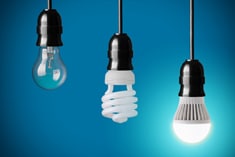Jakarta, 7 July 2015 The United Nations Environment Programme (UNEP)–Global Environment Facility (GEF) en.lighten initiative is pleased to announce their new guidance note, Developing Minimum Energy Performance Standards for Lighting Products. Released during the SWITCH-Asia regional event – Advancing Energy Efficiency in Asia Through SCP and Green Finance – in Jakarta yesterday, this practical resource for governments will help policymakers better understand the benefits of minimum energy performance standards (MEPS) for achieving their energy efficiency goals.
Electricity for lighting accounts for almost 15% of electricity consumption and around 6% of CO2 emissions worldwide. MEPS offer a fundamental foundation for any Government striving to accelerate the deployment of efficient lighting solutions on a permanent and sustainable basis. Coupled with enabling legislation and an effective compliance strategy, they facilitate a transition to more efficient lighting by specifying the minimum energy efficiency of the products that may be offered for sale in the market.
This new UNEP-GEF en.lighten initiative guidance note provides a practical resource for governments on the issues to consider when establishing MEPS in their country. It outlines a step-by-step approach to integrating MEPS into national policies and strategies, and provides practical advice, reinforced by case studies, drawn from the experiences of those countries and regions already enforcing efficient lighting MEPS.
The guidance is as valid for those countries that have not yet implemented MEPS for energy efficient lighting and appliances, as it is to those that have already started the journey and would like to review and update their regulatory mechanisms to account for more ambitious targets.
Speaking from Jakarta, Dr Sanjayan Velautham, Executive Director of the ASEAN Center for Energy, highlighted the relevance of the guidance note: “Minimum energy performance standards can go a long way as part of a package of measures to improve energy efficiency and contribute in our efforts to reduce greenhouse gases emissions in the ASEAN region. This publication comes timely with the ASEAN harmonization of lighting standards which will be initiated this year.”
UNEP hopes that governments will be inspired by the case presented and will make it a reality by developing and implementing lighting MEPS in support of energy efficiency and climate change mitigation.
To download a copy of the guidance note, click here
